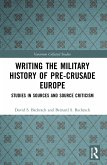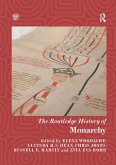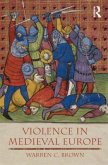Warfare in Medieval Europe, now in its second edition, offers considerably more attention to the transition from the later Roman Empire to the early Middle Ages, the composition of the armies of the opponents of the West, and the experience of commanders and individual combatants on the battlefield.
This second revised and expanded edition provides a more in-depth thematic discussion of the nature and conduct of war, with an emphasis on its overall impact on society, from the late Roman Empire to the end of the Hundred Years' War. The authors explore the origins of the institutions, physical infrastructure, and intellectual underpinnings of warfare, with chapters on military topography, military technology, logistics, combat, and strategy. Bernard and David Bachrach have also added a new chapter, which provides two detailed campaign narratives that highlight the themes treated throughout the text. The geographical scope of the volume encompasses Latin Europe, the Slavic World, Scandinavia, and the eastern Mediterranean, with a particular focus on the conflict between Western Christianity and the Islamic Near East.
Written in an accessible and engaging way, Warfare in Medieval Europe is the ideal resource for all students of the history of medieval warfare.
This second revised and expanded edition provides a more in-depth thematic discussion of the nature and conduct of war, with an emphasis on its overall impact on society, from the late Roman Empire to the end of the Hundred Years' War. The authors explore the origins of the institutions, physical infrastructure, and intellectual underpinnings of warfare, with chapters on military topography, military technology, logistics, combat, and strategy. Bernard and David Bachrach have also added a new chapter, which provides two detailed campaign narratives that highlight the themes treated throughout the text. The geographical scope of the volume encompasses Latin Europe, the Slavic World, Scandinavia, and the eastern Mediterranean, with a particular focus on the conflict between Western Christianity and the Islamic Near East.
Written in an accessible and engaging way, Warfare in Medieval Europe is the ideal resource for all students of the history of medieval warfare.
Praise for previous edition:
'This book is a masterpiece, bringing together the collected scholarship of the past several decades and more in a brilliant synthesis that illuminates not only medieval military matters, but the whole "medieval millennium" as well.'
Paul F. Crawford, California University of Pennsylvania, USA
'The perfect introduction to Medieval Warfare for students of history and strategic or security studies. This is an excellent overview which teases out evidence for the continuity of Roman institutions and infrastructure, and furnishes evidence for the complexity of medieval warfare including the complex and discriminating application of military, economic and diplomatic tools - in short, grand strategy. Firmly rooted in source evidence, this remains faithful to contemporary terminology yet helps us interpret it in the light of today's military-strategic vocabulary.'
Beatrice Heuser, University of Reading, UK
'This book is a masterpiece, bringing together the collected scholarship of the past several decades and more in a brilliant synthesis that illuminates not only medieval military matters, but the whole "medieval millennium" as well.'
Paul F. Crawford, California University of Pennsylvania, USA
'The perfect introduction to Medieval Warfare for students of history and strategic or security studies. This is an excellent overview which teases out evidence for the continuity of Roman institutions and infrastructure, and furnishes evidence for the complexity of medieval warfare including the complex and discriminating application of military, economic and diplomatic tools - in short, grand strategy. Firmly rooted in source evidence, this remains faithful to contemporary terminology yet helps us interpret it in the light of today's military-strategic vocabulary.'
Beatrice Heuser, University of Reading, UK








